NURSING Report: Aboriginal Social and Emotional Well-being
VerifiedAdded on 2020/11/12
|8
|1955
|105
Report
AI Summary
This nursing report provides an in-depth analysis of social and emotional well-being (SEWB) within Aboriginal communities, contrasting it with the concept of mental health. It explores the historical evolution of Aboriginal Medical Services and their alignment with the World Health Organization's principles of primary care. The report highlights the significance of cultural, spiritual, and community connections for the Indigenous population's overall health. Furthermore, it discusses the practical implementation of SEWB in Aboriginal Community Controlled Health services, emphasizing the need for government funding and culturally sensitive healthcare practices. The report concludes by stressing the importance of addressing both SEWB and mental health concerns to ensure comprehensive care for Aboriginal and Torres Strait Islander individuals, including the importance of providing financial support to Aboriginal Community Controlled Health services. It underscores the need for health promotion campaigns and emphasizes the importance of recognizing and addressing mental health problems.
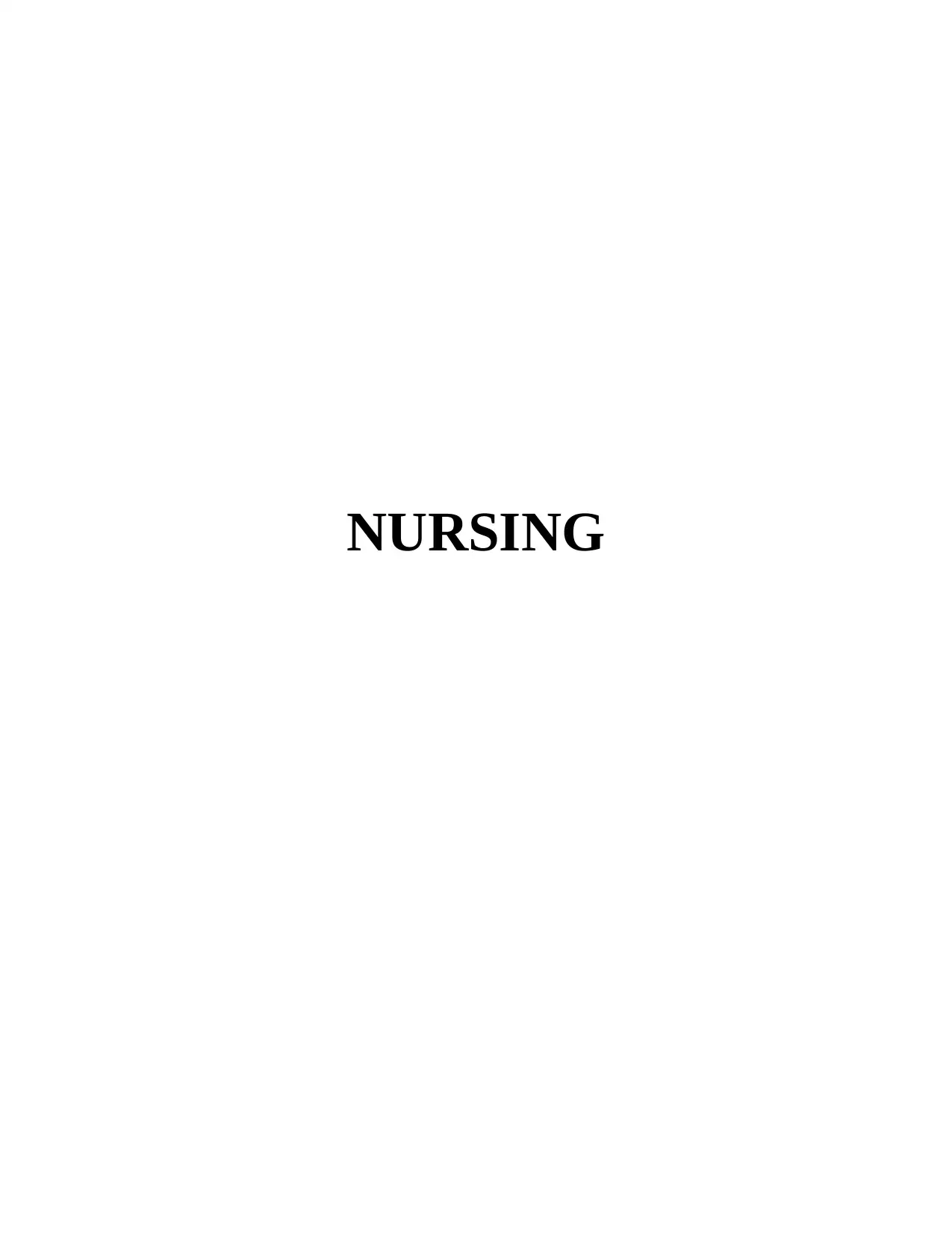
NURSING
Paraphrase This Document
Need a fresh take? Get an instant paraphrase of this document with our AI Paraphraser
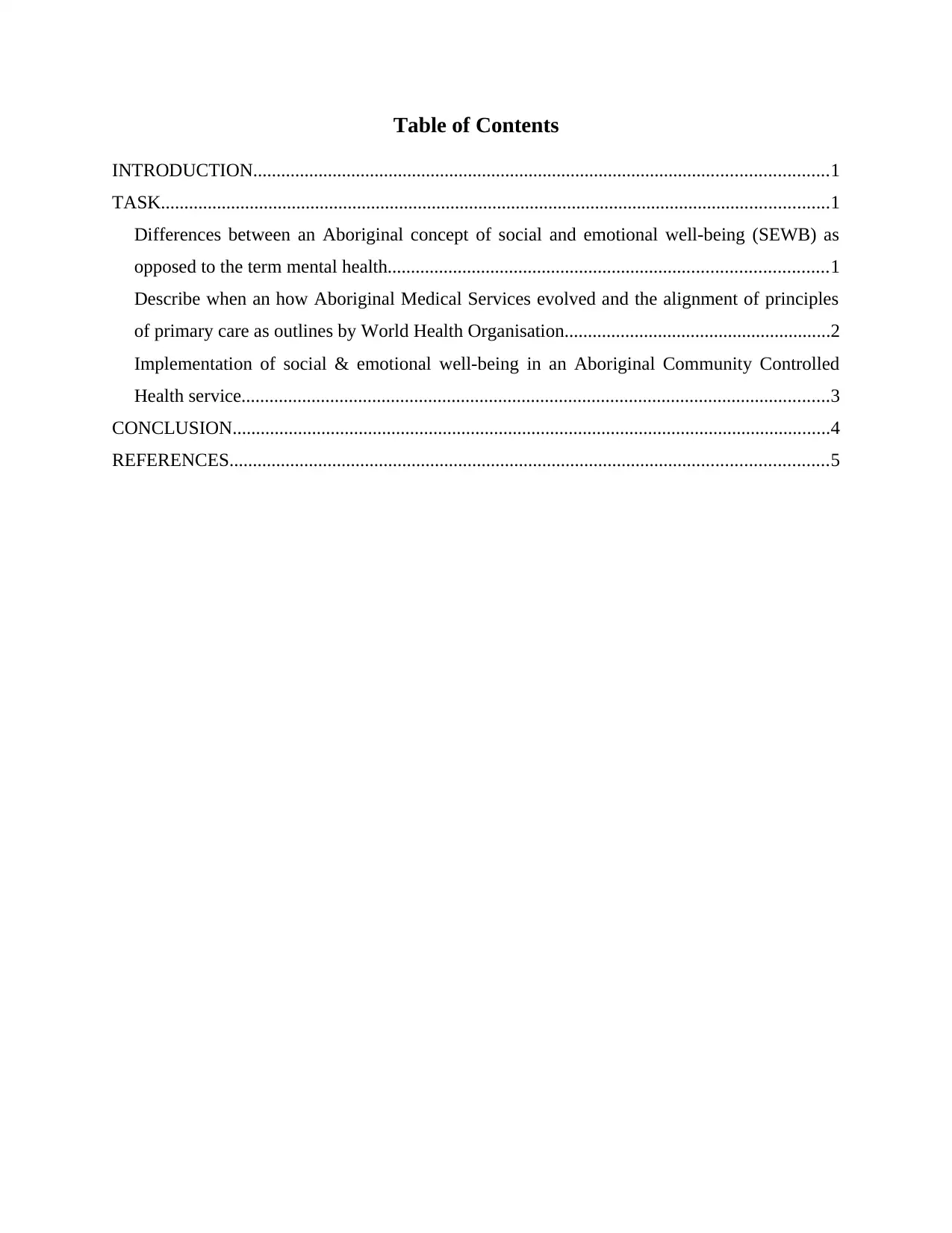
Table of Contents
INTRODUCTION...........................................................................................................................1
TASK...............................................................................................................................................1
Differences between an Aboriginal concept of social and emotional well-being (SEWB) as
opposed to the term mental health..............................................................................................1
Describe when an how Aboriginal Medical Services evolved and the alignment of principles
of primary care as outlines by World Health Organisation.........................................................2
Implementation of social & emotional well-being in an Aboriginal Community Controlled
Health service..............................................................................................................................3
CONCLUSION................................................................................................................................4
REFERENCES................................................................................................................................5
INTRODUCTION...........................................................................................................................1
TASK...............................................................................................................................................1
Differences between an Aboriginal concept of social and emotional well-being (SEWB) as
opposed to the term mental health..............................................................................................1
Describe when an how Aboriginal Medical Services evolved and the alignment of principles
of primary care as outlines by World Health Organisation.........................................................2
Implementation of social & emotional well-being in an Aboriginal Community Controlled
Health service..............................................................................................................................3
CONCLUSION................................................................................................................................4
REFERENCES................................................................................................................................5

⊘ This is a preview!⊘
Do you want full access?
Subscribe today to unlock all pages.

Trusted by 1+ million students worldwide
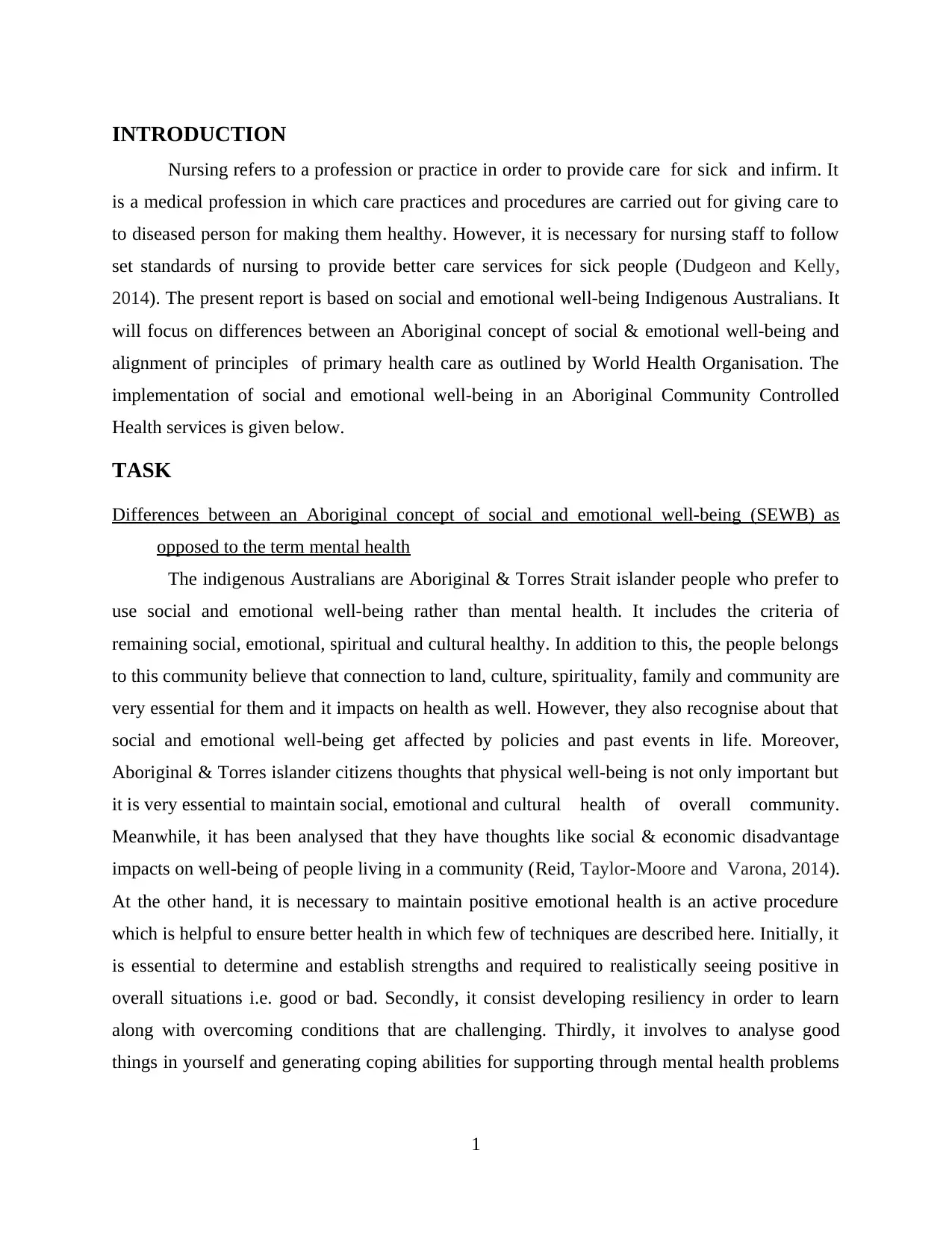
INTRODUCTION
Nursing refers to a profession or practice in order to provide care for sick and infirm. It
is a medical profession in which care practices and procedures are carried out for giving care to
to diseased person for making them healthy. However, it is necessary for nursing staff to follow
set standards of nursing to provide better care services for sick people (Dudgeon and Kelly,
2014). The present report is based on social and emotional well-being Indigenous Australians. It
will focus on differences between an Aboriginal concept of social & emotional well-being and
alignment of principles of primary health care as outlined by World Health Organisation. The
implementation of social and emotional well-being in an Aboriginal Community Controlled
Health services is given below.
TASK
Differences between an Aboriginal concept of social and emotional well-being (SEWB) as
opposed to the term mental health
The indigenous Australians are Aboriginal & Torres Strait islander people who prefer to
use social and emotional well-being rather than mental health. It includes the criteria of
remaining social, emotional, spiritual and cultural healthy. In addition to this, the people belongs
to this community believe that connection to land, culture, spirituality, family and community are
very essential for them and it impacts on health as well. However, they also recognise about that
social and emotional well-being get affected by policies and past events in life. Moreover,
Aboriginal & Torres islander citizens thoughts that physical well-being is not only important but
it is very essential to maintain social, emotional and cultural health of overall community.
Meanwhile, it has been analysed that they have thoughts like social & economic disadvantage
impacts on well-being of people living in a community (Reid, Taylor-Moore and Varona, 2014).
At the other hand, it is necessary to maintain positive emotional health is an active procedure
which is helpful to ensure better health in which few of techniques are described here. Initially, it
is essential to determine and establish strengths and required to realistically seeing positive in
overall situations i.e. good or bad. Secondly, it consist developing resiliency in order to learn
along with overcoming conditions that are challenging. Thirdly, it involves to analyse good
things in yourself and generating coping abilities for supporting through mental health problems
1
Nursing refers to a profession or practice in order to provide care for sick and infirm. It
is a medical profession in which care practices and procedures are carried out for giving care to
to diseased person for making them healthy. However, it is necessary for nursing staff to follow
set standards of nursing to provide better care services for sick people (Dudgeon and Kelly,
2014). The present report is based on social and emotional well-being Indigenous Australians. It
will focus on differences between an Aboriginal concept of social & emotional well-being and
alignment of principles of primary health care as outlined by World Health Organisation. The
implementation of social and emotional well-being in an Aboriginal Community Controlled
Health services is given below.
TASK
Differences between an Aboriginal concept of social and emotional well-being (SEWB) as
opposed to the term mental health
The indigenous Australians are Aboriginal & Torres Strait islander people who prefer to
use social and emotional well-being rather than mental health. It includes the criteria of
remaining social, emotional, spiritual and cultural healthy. In addition to this, the people belongs
to this community believe that connection to land, culture, spirituality, family and community are
very essential for them and it impacts on health as well. However, they also recognise about that
social and emotional well-being get affected by policies and past events in life. Moreover,
Aboriginal & Torres islander citizens thoughts that physical well-being is not only important but
it is very essential to maintain social, emotional and cultural health of overall community.
Meanwhile, it has been analysed that they have thoughts like social & economic disadvantage
impacts on well-being of people living in a community (Reid, Taylor-Moore and Varona, 2014).
At the other hand, it is necessary to maintain positive emotional health is an active procedure
which is helpful to ensure better health in which few of techniques are described here. Initially, it
is essential to determine and establish strengths and required to realistically seeing positive in
overall situations i.e. good or bad. Secondly, it consist developing resiliency in order to learn
along with overcoming conditions that are challenging. Thirdly, it involves to analyse good
things in yourself and generating coping abilities for supporting through mental health problems
1
Paraphrase This Document
Need a fresh take? Get an instant paraphrase of this document with our AI Paraphraser
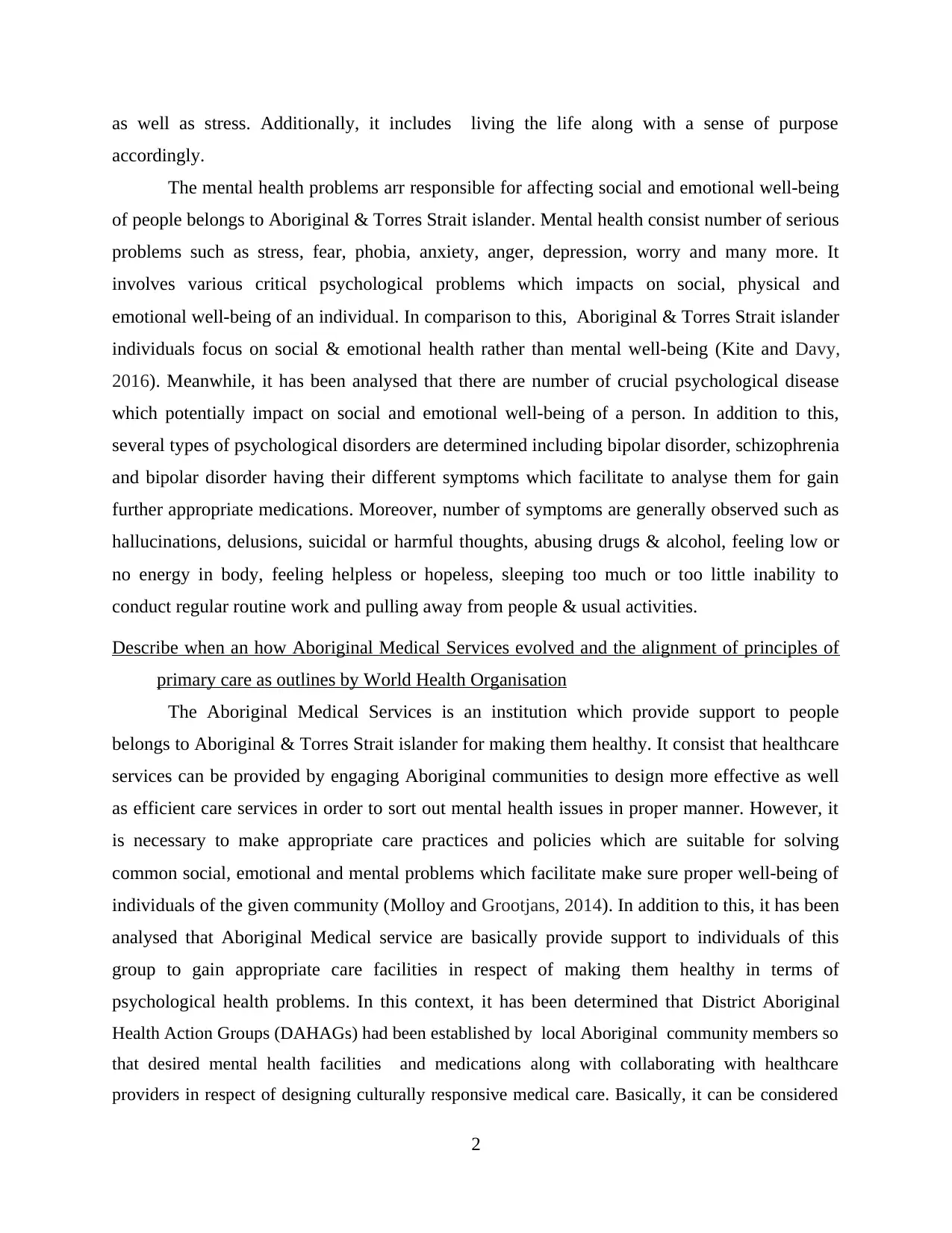
as well as stress. Additionally, it includes living the life along with a sense of purpose
accordingly.
The mental health problems arr responsible for affecting social and emotional well-being
of people belongs to Aboriginal & Torres Strait islander. Mental health consist number of serious
problems such as stress, fear, phobia, anxiety, anger, depression, worry and many more. It
involves various critical psychological problems which impacts on social, physical and
emotional well-being of an individual. In comparison to this, Aboriginal & Torres Strait islander
individuals focus on social & emotional health rather than mental well-being (Kite and Davy,
2016). Meanwhile, it has been analysed that there are number of crucial psychological disease
which potentially impact on social and emotional well-being of a person. In addition to this,
several types of psychological disorders are determined including bipolar disorder, schizophrenia
and bipolar disorder having their different symptoms which facilitate to analyse them for gain
further appropriate medications. Moreover, number of symptoms are generally observed such as
hallucinations, delusions, suicidal or harmful thoughts, abusing drugs & alcohol, feeling low or
no energy in body, feeling helpless or hopeless, sleeping too much or too little inability to
conduct regular routine work and pulling away from people & usual activities.
Describe when an how Aboriginal Medical Services evolved and the alignment of principles of
primary care as outlines by World Health Organisation
The Aboriginal Medical Services is an institution which provide support to people
belongs to Aboriginal & Torres Strait islander for making them healthy. It consist that healthcare
services can be provided by engaging Aboriginal communities to design more effective as well
as efficient care services in order to sort out mental health issues in proper manner. However, it
is necessary to make appropriate care practices and policies which are suitable for solving
common social, emotional and mental problems which facilitate make sure proper well-being of
individuals of the given community (Molloy and Grootjans, 2014). In addition to this, it has been
analysed that Aboriginal Medical service are basically provide support to individuals of this
group to gain appropriate care facilities in respect of making them healthy in terms of
psychological health problems. In this context, it has been determined that District Aboriginal
Health Action Groups (DAHAGs) had been established by local Aboriginal community members so
that desired mental health facilities and medications along with collaborating with healthcare
providers in respect of designing culturally responsive medical care. Basically, it can be considered
2
accordingly.
The mental health problems arr responsible for affecting social and emotional well-being
of people belongs to Aboriginal & Torres Strait islander. Mental health consist number of serious
problems such as stress, fear, phobia, anxiety, anger, depression, worry and many more. It
involves various critical psychological problems which impacts on social, physical and
emotional well-being of an individual. In comparison to this, Aboriginal & Torres Strait islander
individuals focus on social & emotional health rather than mental well-being (Kite and Davy,
2016). Meanwhile, it has been analysed that there are number of crucial psychological disease
which potentially impact on social and emotional well-being of a person. In addition to this,
several types of psychological disorders are determined including bipolar disorder, schizophrenia
and bipolar disorder having their different symptoms which facilitate to analyse them for gain
further appropriate medications. Moreover, number of symptoms are generally observed such as
hallucinations, delusions, suicidal or harmful thoughts, abusing drugs & alcohol, feeling low or
no energy in body, feeling helpless or hopeless, sleeping too much or too little inability to
conduct regular routine work and pulling away from people & usual activities.
Describe when an how Aboriginal Medical Services evolved and the alignment of principles of
primary care as outlines by World Health Organisation
The Aboriginal Medical Services is an institution which provide support to people
belongs to Aboriginal & Torres Strait islander for making them healthy. It consist that healthcare
services can be provided by engaging Aboriginal communities to design more effective as well
as efficient care services in order to sort out mental health issues in proper manner. However, it
is necessary to make appropriate care practices and policies which are suitable for solving
common social, emotional and mental problems which facilitate make sure proper well-being of
individuals of the given community (Molloy and Grootjans, 2014). In addition to this, it has been
analysed that Aboriginal Medical service are basically provide support to individuals of this
group to gain appropriate care facilities in respect of making them healthy in terms of
psychological health problems. In this context, it has been determined that District Aboriginal
Health Action Groups (DAHAGs) had been established by local Aboriginal community members so
that desired mental health facilities and medications along with collaborating with healthcare
providers in respect of designing culturally responsive medical care. Basically, it can be considered
2
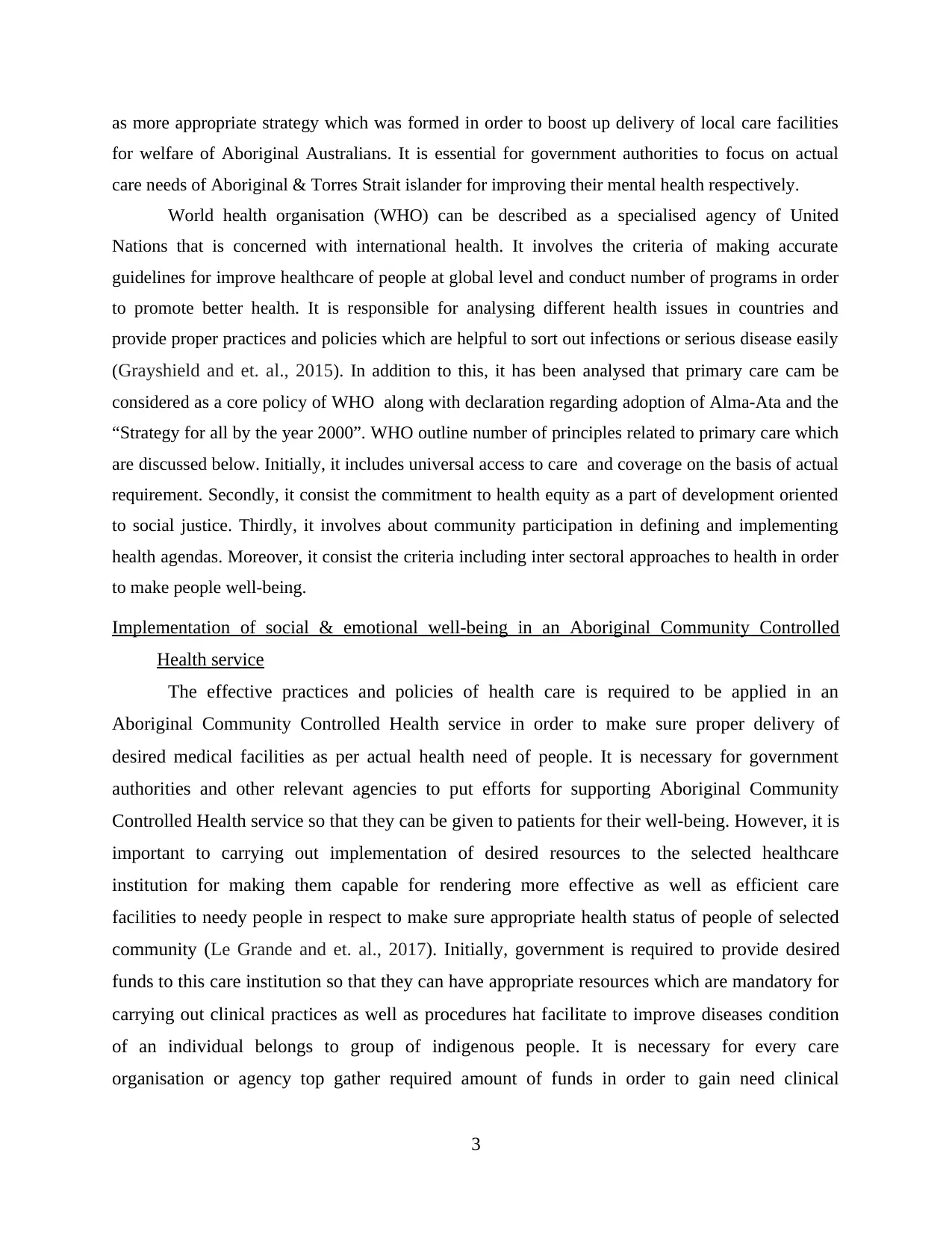
as more appropriate strategy which was formed in order to boost up delivery of local care facilities
for welfare of Aboriginal Australians. It is essential for government authorities to focus on actual
care needs of Aboriginal & Torres Strait islander for improving their mental health respectively.
World health organisation (WHO) can be described as a specialised agency of United
Nations that is concerned with international health. It involves the criteria of making accurate
guidelines for improve healthcare of people at global level and conduct number of programs in order
to promote better health. It is responsible for analysing different health issues in countries and
provide proper practices and policies which are helpful to sort out infections or serious disease easily
(Grayshield and et. al., 2015). In addition to this, it has been analysed that primary care cam be
considered as a core policy of WHO along with declaration regarding adoption of Alma-Ata and the
“Strategy for all by the year 2000”. WHO outline number of principles related to primary care which
are discussed below. Initially, it includes universal access to care and coverage on the basis of actual
requirement. Secondly, it consist the commitment to health equity as a part of development oriented
to social justice. Thirdly, it involves about community participation in defining and implementing
health agendas. Moreover, it consist the criteria including inter sectoral approaches to health in order
to make people well-being.
Implementation of social & emotional well-being in an Aboriginal Community Controlled
Health service
The effective practices and policies of health care is required to be applied in an
Aboriginal Community Controlled Health service in order to make sure proper delivery of
desired medical facilities as per actual health need of people. It is necessary for government
authorities and other relevant agencies to put efforts for supporting Aboriginal Community
Controlled Health service so that they can be given to patients for their well-being. However, it is
important to carrying out implementation of desired resources to the selected healthcare
institution for making them capable for rendering more effective as well as efficient care
facilities to needy people in respect to make sure appropriate health status of people of selected
community (Le Grande and et. al., 2017). Initially, government is required to provide desired
funds to this care institution so that they can have appropriate resources which are mandatory for
carrying out clinical practices as well as procedures hat facilitate to improve diseases condition
of an individual belongs to group of indigenous people. It is necessary for every care
organisation or agency top gather required amount of funds in order to gain need clinical
3
for welfare of Aboriginal Australians. It is essential for government authorities to focus on actual
care needs of Aboriginal & Torres Strait islander for improving their mental health respectively.
World health organisation (WHO) can be described as a specialised agency of United
Nations that is concerned with international health. It involves the criteria of making accurate
guidelines for improve healthcare of people at global level and conduct number of programs in order
to promote better health. It is responsible for analysing different health issues in countries and
provide proper practices and policies which are helpful to sort out infections or serious disease easily
(Grayshield and et. al., 2015). In addition to this, it has been analysed that primary care cam be
considered as a core policy of WHO along with declaration regarding adoption of Alma-Ata and the
“Strategy for all by the year 2000”. WHO outline number of principles related to primary care which
are discussed below. Initially, it includes universal access to care and coverage on the basis of actual
requirement. Secondly, it consist the commitment to health equity as a part of development oriented
to social justice. Thirdly, it involves about community participation in defining and implementing
health agendas. Moreover, it consist the criteria including inter sectoral approaches to health in order
to make people well-being.
Implementation of social & emotional well-being in an Aboriginal Community Controlled
Health service
The effective practices and policies of health care is required to be applied in an
Aboriginal Community Controlled Health service in order to make sure proper delivery of
desired medical facilities as per actual health need of people. It is necessary for government
authorities and other relevant agencies to put efforts for supporting Aboriginal Community
Controlled Health service so that they can be given to patients for their well-being. However, it is
important to carrying out implementation of desired resources to the selected healthcare
institution for making them capable for rendering more effective as well as efficient care
facilities to needy people in respect to make sure appropriate health status of people of selected
community (Le Grande and et. al., 2017). Initially, government is required to provide desired
funds to this care institution so that they can have appropriate resources which are mandatory for
carrying out clinical practices as well as procedures hat facilitate to improve diseases condition
of an individual belongs to group of indigenous people. It is necessary for every care
organisation or agency top gather required amount of funds in order to gain need clinical
3
⊘ This is a preview!⊘
Do you want full access?
Subscribe today to unlock all pages.

Trusted by 1+ million students worldwide
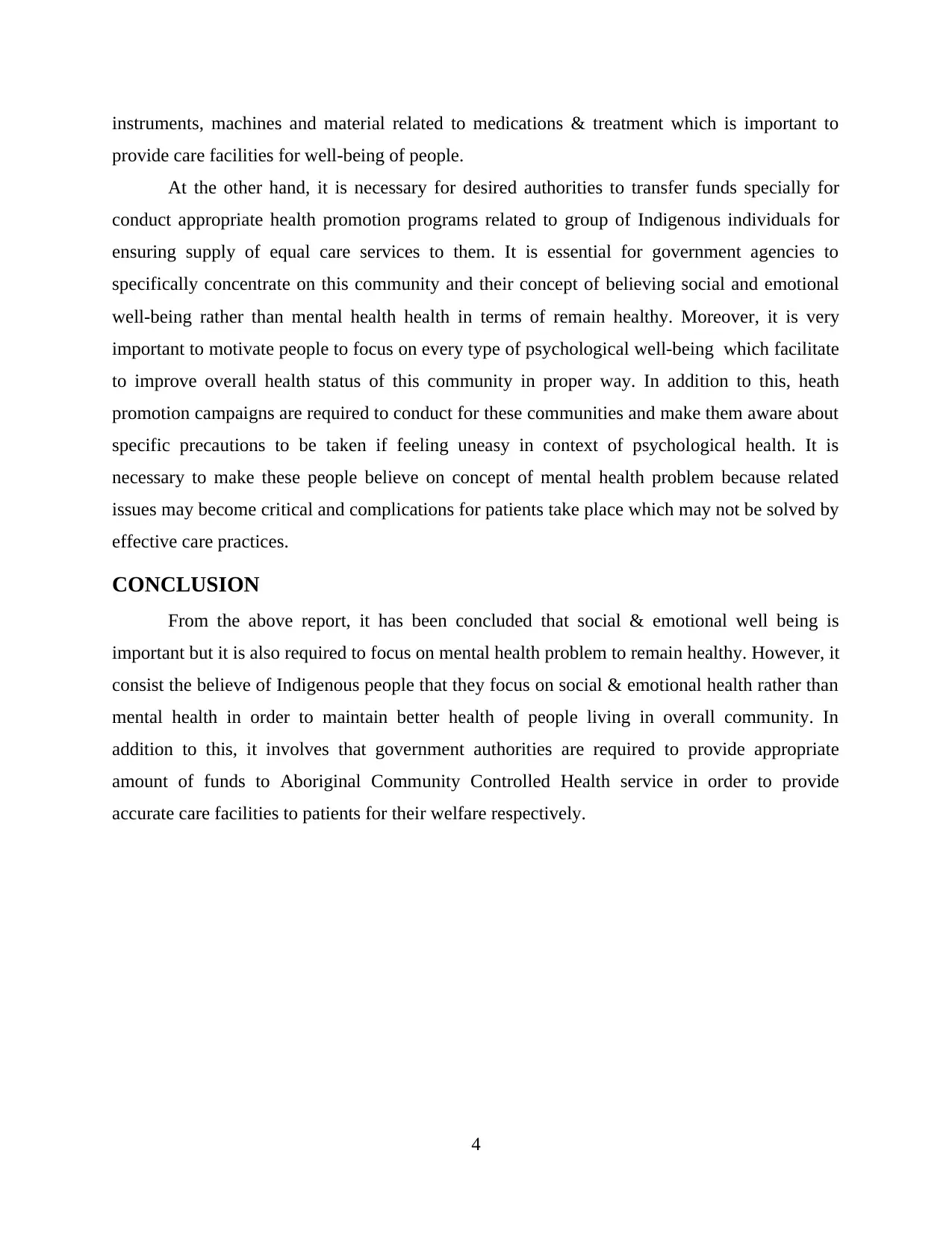
instruments, machines and material related to medications & treatment which is important to
provide care facilities for well-being of people.
At the other hand, it is necessary for desired authorities to transfer funds specially for
conduct appropriate health promotion programs related to group of Indigenous individuals for
ensuring supply of equal care services to them. It is essential for government agencies to
specifically concentrate on this community and their concept of believing social and emotional
well-being rather than mental health health in terms of remain healthy. Moreover, it is very
important to motivate people to focus on every type of psychological well-being which facilitate
to improve overall health status of this community in proper way. In addition to this, heath
promotion campaigns are required to conduct for these communities and make them aware about
specific precautions to be taken if feeling uneasy in context of psychological health. It is
necessary to make these people believe on concept of mental health problem because related
issues may become critical and complications for patients take place which may not be solved by
effective care practices.
CONCLUSION
From the above report, it has been concluded that social & emotional well being is
important but it is also required to focus on mental health problem to remain healthy. However, it
consist the believe of Indigenous people that they focus on social & emotional health rather than
mental health in order to maintain better health of people living in overall community. In
addition to this, it involves that government authorities are required to provide appropriate
amount of funds to Aboriginal Community Controlled Health service in order to provide
accurate care facilities to patients for their welfare respectively.
4
provide care facilities for well-being of people.
At the other hand, it is necessary for desired authorities to transfer funds specially for
conduct appropriate health promotion programs related to group of Indigenous individuals for
ensuring supply of equal care services to them. It is essential for government agencies to
specifically concentrate on this community and their concept of believing social and emotional
well-being rather than mental health health in terms of remain healthy. Moreover, it is very
important to motivate people to focus on every type of psychological well-being which facilitate
to improve overall health status of this community in proper way. In addition to this, heath
promotion campaigns are required to conduct for these communities and make them aware about
specific precautions to be taken if feeling uneasy in context of psychological health. It is
necessary to make these people believe on concept of mental health problem because related
issues may become critical and complications for patients take place which may not be solved by
effective care practices.
CONCLUSION
From the above report, it has been concluded that social & emotional well being is
important but it is also required to focus on mental health problem to remain healthy. However, it
consist the believe of Indigenous people that they focus on social & emotional health rather than
mental health in order to maintain better health of people living in overall community. In
addition to this, it involves that government authorities are required to provide appropriate
amount of funds to Aboriginal Community Controlled Health service in order to provide
accurate care facilities to patients for their welfare respectively.
4
Paraphrase This Document
Need a fresh take? Get an instant paraphrase of this document with our AI Paraphraser
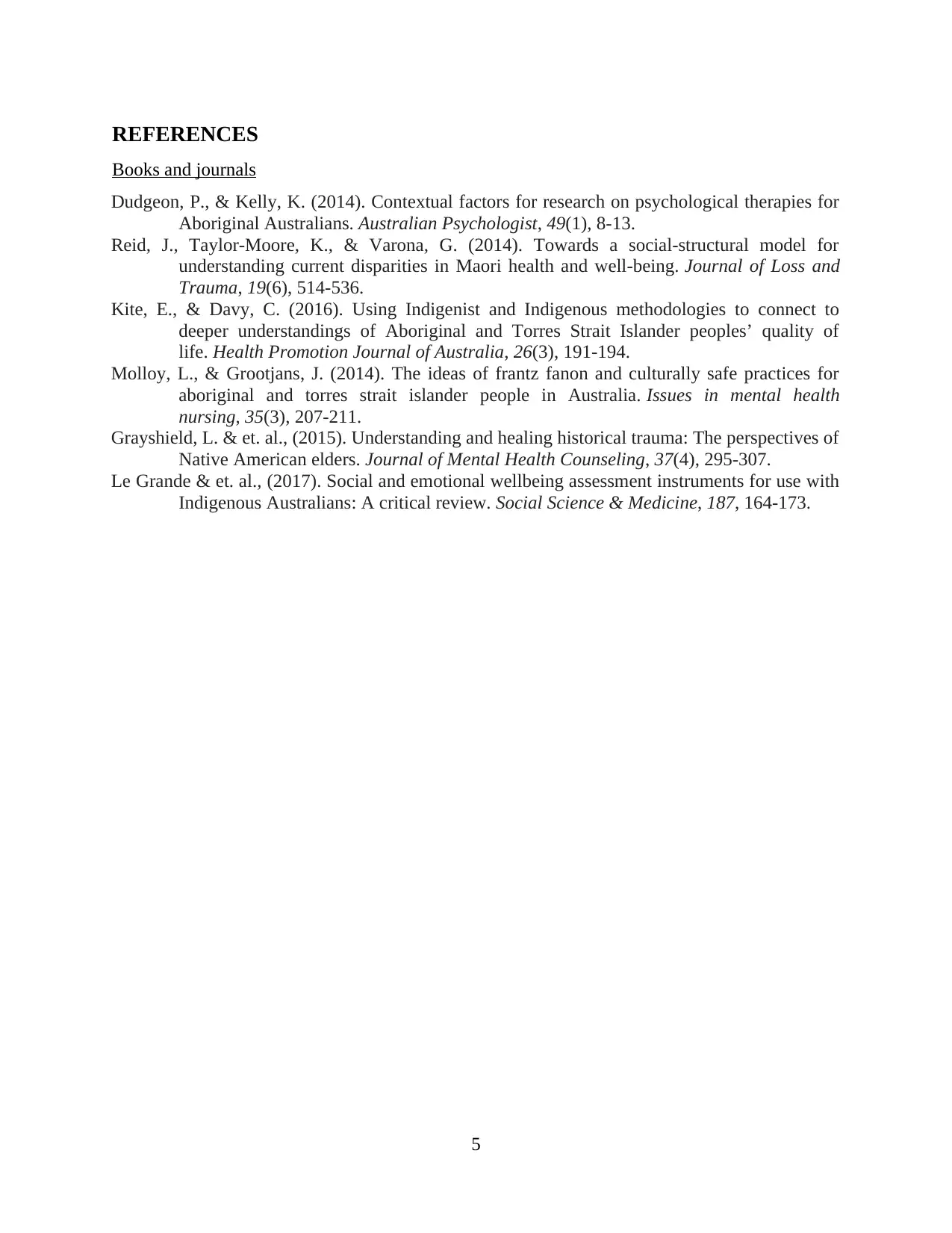
REFERENCES
Books and journals
Dudgeon, P., & Kelly, K. (2014). Contextual factors for research on psychological therapies for
Aboriginal Australians. Australian Psychologist, 49(1), 8-13.
Reid, J., Taylor-Moore, K., & Varona, G. (2014). Towards a social-structural model for
understanding current disparities in Maori health and well-being. Journal of Loss and
Trauma, 19(6), 514-536.
Kite, E., & Davy, C. (2016). Using Indigenist and Indigenous methodologies to connect to
deeper understandings of Aboriginal and Torres Strait Islander peoples’ quality of
life. Health Promotion Journal of Australia, 26(3), 191-194.
Molloy, L., & Grootjans, J. (2014). The ideas of frantz fanon and culturally safe practices for
aboriginal and torres strait islander people in Australia. Issues in mental health
nursing, 35(3), 207-211.
Grayshield, L. & et. al., (2015). Understanding and healing historical trauma: The perspectives of
Native American elders. Journal of Mental Health Counseling, 37(4), 295-307.
Le Grande & et. al., (2017). Social and emotional wellbeing assessment instruments for use with
Indigenous Australians: A critical review. Social Science & Medicine, 187, 164-173.
5
Books and journals
Dudgeon, P., & Kelly, K. (2014). Contextual factors for research on psychological therapies for
Aboriginal Australians. Australian Psychologist, 49(1), 8-13.
Reid, J., Taylor-Moore, K., & Varona, G. (2014). Towards a social-structural model for
understanding current disparities in Maori health and well-being. Journal of Loss and
Trauma, 19(6), 514-536.
Kite, E., & Davy, C. (2016). Using Indigenist and Indigenous methodologies to connect to
deeper understandings of Aboriginal and Torres Strait Islander peoples’ quality of
life. Health Promotion Journal of Australia, 26(3), 191-194.
Molloy, L., & Grootjans, J. (2014). The ideas of frantz fanon and culturally safe practices for
aboriginal and torres strait islander people in Australia. Issues in mental health
nursing, 35(3), 207-211.
Grayshield, L. & et. al., (2015). Understanding and healing historical trauma: The perspectives of
Native American elders. Journal of Mental Health Counseling, 37(4), 295-307.
Le Grande & et. al., (2017). Social and emotional wellbeing assessment instruments for use with
Indigenous Australians: A critical review. Social Science & Medicine, 187, 164-173.
5
1 out of 8
Related Documents
Your All-in-One AI-Powered Toolkit for Academic Success.
+13062052269
info@desklib.com
Available 24*7 on WhatsApp / Email
![[object Object]](/_next/static/media/star-bottom.7253800d.svg)
Unlock your academic potential
Copyright © 2020–2026 A2Z Services. All Rights Reserved. Developed and managed by ZUCOL.





